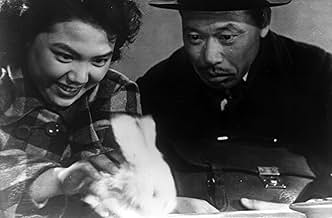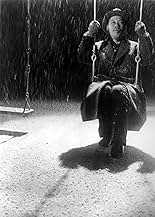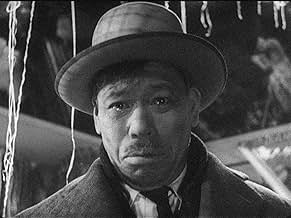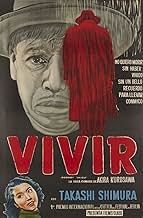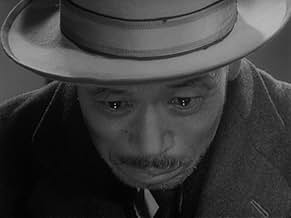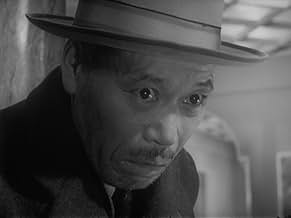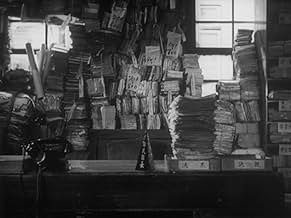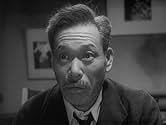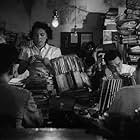Un bureaucrate essaie de trouver un sens à sa vie suite à la découverte qu'il a un cancer en phase terminale.Un bureaucrate essaie de trouver un sens à sa vie suite à la découverte qu'il a un cancer en phase terminale.Un bureaucrate essaie de trouver un sens à sa vie suite à la découverte qu'il a un cancer en phase terminale.
- Réalisation
- Scénario
- Casting principal
- Nomination aux 1 BAFTA Award
- 6 victoires et 2 nominations au total
Avis à la une
Kanji Watanabe discovers that he has cancer, and tries to seek some sort of meaning in his final days, he becomes aware that he's operated as a cog in the giant domestic machinery, and fights against the system.
I've been working my way through The Kurosawa films, and thus far I've been impressed with the lot, I'll be honest, I expected a Samurai film, and when it became apparent that that wasn't the case either, I thought it may have been a mystery, it wasn't that either, instead it turned out to be a rather intimate, absorbing character study.
It shows that despite being essentially part of a machine, Kanji has a very human side, only he realises it too late.
This film moved me to tears on occasion, it had me laughing, it certainly had be captivated for the whole running time. That moment where Kanji explains what's happening to his son, it was phenomenal.
I am learning more about Kurosawa with each film I watch, but I must admit, this one threw me totally off guard, it wasn't what I was expecting, it further enhances my realisation that Kurosawa was a genius.
Remember all work and no play! There's a really meaningful message in this film.
9/10.
I've been working my way through The Kurosawa films, and thus far I've been impressed with the lot, I'll be honest, I expected a Samurai film, and when it became apparent that that wasn't the case either, I thought it may have been a mystery, it wasn't that either, instead it turned out to be a rather intimate, absorbing character study.
It shows that despite being essentially part of a machine, Kanji has a very human side, only he realises it too late.
This film moved me to tears on occasion, it had me laughing, it certainly had be captivated for the whole running time. That moment where Kanji explains what's happening to his son, it was phenomenal.
I am learning more about Kurosawa with each film I watch, but I must admit, this one threw me totally off guard, it wasn't what I was expecting, it further enhances my realisation that Kurosawa was a genius.
Remember all work and no play! There's a really meaningful message in this film.
9/10.
Ikiru is a film about life. Constantly complex and thought-provoking, although simple at the same time; it tells a story about life's limits, how we perceive life and the fact that life is short and not to be wasted. Our hero is Kanji Watanabe, the most unlikely 'hero' of all time. He works in a dreary city office, where nothing happens and it's all very meaningless. Watanabe is particularly boring, which has lead to him being nicknamed 'The Mummy' by a fellow worker. He later learns that he is dying from stomach cancer and that he only has six months to live. But Watanabe has been dead for thirty years, and now that he's learned that his life has a limit; it's time for Watanabe to escape his dreary life and finally start living. What follows is probably the most thoughtful analysis of life ever filmed.
Ikiru marks a departure for Akira Kurosawa, a man better known for his samurai films, but it's a welcome departure in my opinion. Kurosawa constantly refers to Watanabe as 'our hero' throughout the film, and at first this struck me as rather odd because, as I've mentioned, he's probably the least likely hero that Kurosawa has ever directed; but that's just it! This man is not a superhero samurai, but rather an ordinary guy that decides he doesn't want to be useless anymore. That's why he's 'our hero'. Kurosawa makes us feel for the character every moment he's on screen - we're sorry that he's wasted his life, and we're sorry that his wasted life is about to be cruelly cut short. However, despite the bleak and miserable facade that this movie gives out, there is a distinct beauty about it that shines through. The beauty emits from the way that Watanabe tries to redeem his life; because we feel for him and are with him every step of the way, it's easy to see why Watanabe acts in the way he does. Ikiru is a psychologically beautiful film.
It could be said that the fantastic first hour and a half is let down by a more politically based final third - and this is true. The movie needs it's final third in order to finish telling the story, but it really doesn't work as well as the earlier parts did. However, Kurosawa still delights us with some brilliant imagery and the shot of Watanabe on a swing is the most poetically brilliant thing that Kurosawa ever filmed. Together with the music and the rest of the film that you've seen so far; that picture that Kurosawa gives us is as moving as it is brilliant.
Ikiru marks a departure for Akira Kurosawa, a man better known for his samurai films, but it's a welcome departure in my opinion. Kurosawa constantly refers to Watanabe as 'our hero' throughout the film, and at first this struck me as rather odd because, as I've mentioned, he's probably the least likely hero that Kurosawa has ever directed; but that's just it! This man is not a superhero samurai, but rather an ordinary guy that decides he doesn't want to be useless anymore. That's why he's 'our hero'. Kurosawa makes us feel for the character every moment he's on screen - we're sorry that he's wasted his life, and we're sorry that his wasted life is about to be cruelly cut short. However, despite the bleak and miserable facade that this movie gives out, there is a distinct beauty about it that shines through. The beauty emits from the way that Watanabe tries to redeem his life; because we feel for him and are with him every step of the way, it's easy to see why Watanabe acts in the way he does. Ikiru is a psychologically beautiful film.
It could be said that the fantastic first hour and a half is let down by a more politically based final third - and this is true. The movie needs it's final third in order to finish telling the story, but it really doesn't work as well as the earlier parts did. However, Kurosawa still delights us with some brilliant imagery and the shot of Watanabe on a swing is the most poetically brilliant thing that Kurosawa ever filmed. Together with the music and the rest of the film that you've seen so far; that picture that Kurosawa gives us is as moving as it is brilliant.
10OttoVonB
Ikiru ("to live")is a Kurosawa film devoid of samurai or Toshiro Mifune. It is an oddity in his canon, neither an adaptation, nor an epic, or even a detective story. Instead, it is the simple and touching story of the last months of the life of a man, Watanabbe, public official, who decides to give a meaning to his life by transcending the obtuse and stiff mind of government bureaucracy to get a small public children's park built. As a parable for the soulless workings of modern bureaucracy, the goal is set pretty high, and Kurosawa goes even further, giving this story a lot of character, frequent humor, life and, most of all, heart. And going beyond the strengths of the direction and script, is the central performance by Takashi Shimura (later Kambei in Seven Samurai). Shimura gives his character such a transparently good heart and such great pain that every second of Watanabe's plight and struggle tugs at your heart, not in an overwhelmingly sentimental manner, but in one than feels honest and pure. If even many hardened souls will be drawn to tears, it is not for pity, but, admirably, because of envy for Watanabe's beautiful human dignity in the end, and for a film to have such power is beyond pure accomplishment, as the need to see this and, more importantly, feel it, goes beyond pure necessity...
"Ikiru" is supposedly one of Steven Spielberg's favourite films, and one can see the influence it's had on him not only in the sentimentality and the ultimate "feelgood factor" (which may be a little too extreme for some viewers, although the script never condescends), but visually, especially in the virtuoso sequence in which a reprobate leads our hero, a respectable and dull civil servant, on a whirlwind tour of Tokyo's frenzied nightlife - a masterpiece of camera placement and editing. With images throughout that will stay with you for a long time, and a terrific supporting performance by Miki Odagiri as a vivacious young "office lady", "Ikiru" is still an absolute knockout more than 50 years on.
I too have seen all the Samurai films. It was gratifying to watch this tender little film. How would we act if we knew when the end was coming? There are so many terrifying and tender moments in this film. The scenes with the young office mate went from charming to cold-- we knew there was no more than companionship, but she can't really even give him that anymore. The scene when he is about to tell his son about his condition and the young man goes off on a rant about how embarrassingly his father has been acting actually brought me to tears. Of course, it's the price he pays for his cold distance all those years. Then there's the whole bureaucratic nightmare of the office. Even at the wake they don't want to give credit. All the buck passers want a share of his legacy. Maybe families who are living on the edge should watch this movie. Even after more than 50 years, it wears extremely well.
Le saviez-vous
- AnecdotesWhen Takashi Shimura rehearsed his singing of "Song of the Gondola," director Akira Kurosawa instructed him to "sing the song as if you are a stranger in a world where nobody believes you exist."
- GaffesWhen Kanji and the Novelist go to a busy, loud nightclub, the film has been reversed as evidenced by the backwards "Nippon Beer" banner in the background.
- ConnexionsFeatured in The Siskel & Ebert 500th Anniversary Special (1989)
- Bandes originalesJ'ai Deux Amours
(uncredited)
Music by Vincent Scotto
Lyrics by Georges Koger and Henri Varna
Performed by Josephine Baker
[Played when entering the bar with the long-faced man]
Meilleurs choix
Connectez-vous pour évaluer et suivre la liste de favoris afin de recevoir des recommandations personnalisées
Détails
Box-office
- Montant brut aux États-Unis et au Canada
- 60 239 $US
- Week-end de sortie aux États-Unis et au Canada
- 2 149 $US
- 29 déc. 2002
- Montant brut mondial
- 113 821 $US
- Durée2 heures 23 minutes
- Couleur
- Mixage
- Rapport de forme
- 1.37 : 1
Contribuer à cette page
Suggérer une modification ou ajouter du contenu manquant


![Regarder Trailer [OV]](https://m.media-amazon.com/images/M/MV5BMTg4OWJkNjMtM2Y0Mi00MzQ5LTk3Y2YtZWMwNGUyOTIyNGVjXkEyXkFqcGdeQXRyYW5zY29kZS13b3JrZmxvdw@@._V1_QL75_UX500_CR0,47,500,281_.jpg)
